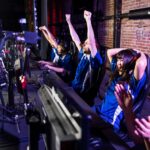
Esports, once relegated to the basement and the recreational centers, have climbed their way up to the ivory towers of academia. In the hallowed halls where Homer, Shakespeare, and Einstein have long been the subjects of deep study, the realm of competitive gaming is making its mark. As esports continue to gain popularity, colleges are not just taking notice. They’re adapting, incorporating these programs into their curriculums, and thereby redefining what it means to study at a post-secondary level.
Just as traditional sports have long been a part of the college experience, esports are now finding their place. This isn’t merely about adding gaming clubs or competitive teams. It’s about reshaping curriculums to include and embrace the study and business of electronic sports. For students buried in assignments who also need to fit in time for their gaming passions, these changes can’t come soon enough. And for those who might feel overwhelmed, essay writing services like essayservice.com are available to help manage the load, ensuring that all areas of study receive the attention they deserve.
Integrating Esports into College Curriculums
Expanding Academic Horizons with New Programs and Courses
The landscape of college education is experiencing a significant shift with the introduction of esports into curriculums. Institutions of higher learning are broadening their academic portfolios to include a variety of esports-related courses. These range from introductory classes on the culture and fundamentals of gaming to advanced seminars that dissect the complex nature of game mechanics, storytelling in gaming, and the socio-economic impacts of esports.

In response to the burgeoning industry, several schools now enable students to declare a major or minor in esports management. This academic track covers an array of essential topics such as event organization, brand management, team logistics, and player coaching techniques, equipping students with the knowledge to navigate the competitive world of esports professionally.
Delving Into the Practical Applications of Gaming
The academic pursuit of esports transcends beyond the thrill of competition. Colleges are crafting curricula that require students to engage in practical, real-world tasks. Assignments might include conducting detailed case studies on successful game launches, developing marketing strategies for upcoming esports tournaments, or analyzing the cognitive impact of gaming on various audiences. These classroom experiences are designed to transcend theoretical knowledge, offering students a taste of the tangible skills they will use in their careers, thus bridging the gap between academic exercises and industry expectations.
The Impact on Campus Life
Fostering Inclusive Communities Through Esports
Esports initiatives are reshaping the social fabric of college campuses by promoting inclusivity and diversity. These programs provide a haven for students of all backgrounds to share in the excitement of team dynamics and collaborative triumphs. By doing so, schools are crafting a welcoming environment that parallels traditional athletic programs, enabling those with a passion for gaming to find their tribe. The camaraderie found in these gaming cohorts echoes the team spirit found in conventional sports, bolstering a sense of belonging among participants.
Ensuring Academic Excellence Alongside Gaming
Integral to the esports program design is an emphasis on scholastic achievement. Many institutions incorporate academic benchmarks, such as maintaining a specified GPA, to ensure that student gamers remain as committed to their studies as they are to their gaming endeavors. These measures aim to strike a healthy balance between esports and education, reinforcing the notion that academic pursuit should not be compromised for the sake of gaming. In turn, students involved in esports learn to manage their time efficiently, juggling lectures, study sessions, and gaming practices.
From Gaming to Career
Crafting a Toolkit for Professional Success
The curriculum for esports doesn’t just prepare students to compete. It’s a comprehensive training ground for a wide array of professional roles within the gaming ecosystem. Beyond understanding game theory and mechanics, students immerse themselves in the technical aspects of esports, such as the nuances of live broadcasting and content production.

The curriculum often encompasses discussions on intellectual property rights, contract negotiation, and the legal frameworks that govern the digital and gaming landscapes. Armed with such diverse expertise, students emerge from these programs as versatile professionals, well-prepared for the multifaceted nature of the esports and gaming industries.
Establishing Valuable Industry Connections
The value of a robust network in the professional world cannot be overstated, especially in an industry as collaborative as esports. Recognizing this, colleges are actively forging partnerships with leading organizations, game developers, and tournament coordinators to provide students with internship placements and networking platforms. These connections can be a springboard for career opportunities, allowing students to engage with potential employers and collaborators long before they don caps and gowns.
Conclusion
Esports programs are more than just a passing trend. They’re a dynamic addition to college curriculums, reflecting the evolving interests and career paths of students. As esports continue to rise in popularity and influence, it’s clear that the academic world is responding in kind, creating programs that are as robust and rigorous as those in any other field of study.
For students seeking assistance in managing their diverse academic and gaming commitments, the best research paper writing service can be a valuable ally. As colleges keep pace with these developments, students are uniquely positioned to reap the benefits, preparing themselves not just for the world of gaming but for the wide array of professional opportunities that lie ahead.












